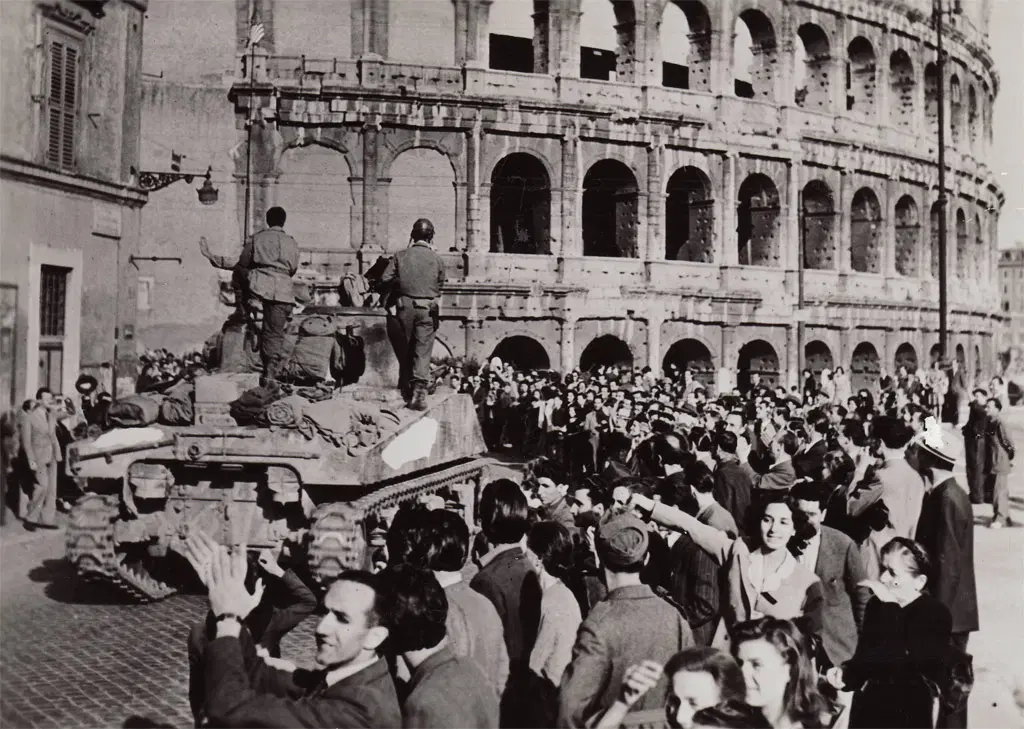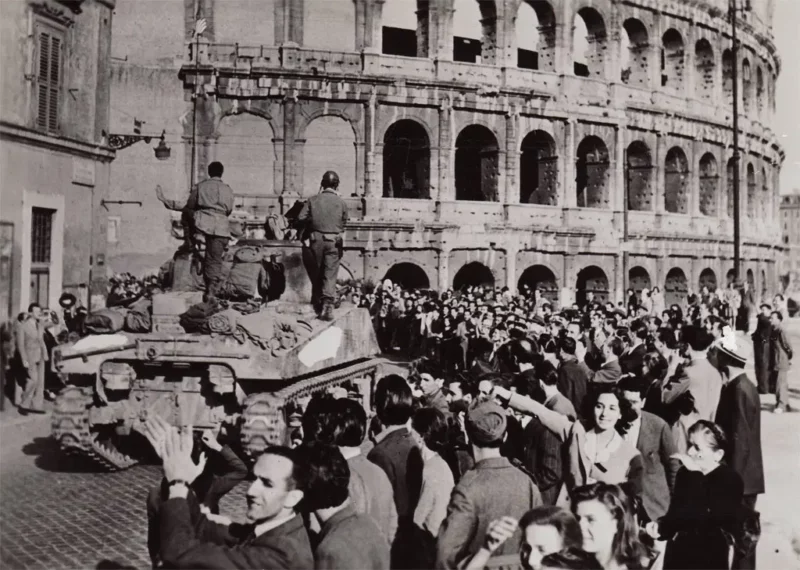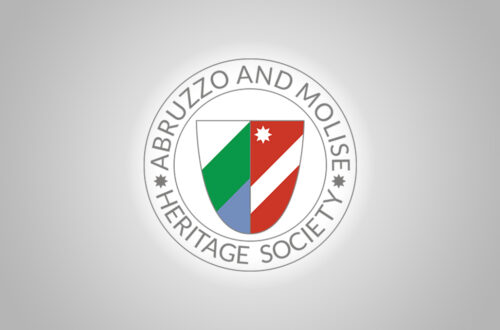
Personal recollections of the Allied Liberation of Rome in June 1944
By Romeo Sabatini, with Introduction by Nancy DeSanti

Credit: barrystrauss.com
There has been a lot of interest in World War II lately with the commemorations of the 80th anniversaries of the liberation of Rome and D-Day in Normandy. So, we would like to share the memories of longtime AMHS member Romeo Sabatini. Many of our members will recall that, for a long time, Romeo was our webmaster and Notiziario editor.
Below are Romeo’s recollections, as a six-year-old, dealing with the Americans coming to Rome in June 1944:
The liberation of Rome. One particularly joyful event was the liberation of Rome by the Allied Forces in 1944. On June 4, the American soldiers entered Rome and paraded through the major downtown streets. I remember it as a sunny, warm day, with people joyously greeting the soldiers, some of them on tanks and jeeps, women hugging them, kissing them, and shouting gloriously. For me, it meant that now I could go freely and fearlessly to the nearby Villa Borghese Park, or walk the length of Via Piemonte to my elementary school, without encountering the ever-present S.S. guards in front of what was the German S.S. Command on Via Piemonte. At that time, I thought that the S.S. on the guards’ helmets stood for the year 44 because It was 1944. There was a real festive atmosphere in Rome that summer of 1944 after the liberation of the city, and it favored us kids who now felt free to roam the streets, to play in the parks, and to deal with the friendly Americans – some of us trying our best to earn a little money, or at least some candy from them.
It was not easy for a family of six like ours to make ends meet during and right after the war, but we made it, thanks to the enterprising spirit and skills we had in our family. My father, who was a policeman before and during the war, lost his job when the Italian police force was disbanded in 1943, but he quickly found temporary jobs as a cook, his craft before joining the police force. He eventually returned to the police force in 1946. My mother, a skilled tailor and embroidery designer, found work at home, finishing dresses for various fashion houses, like Fontana and Schubert. My mother also made all the clothes for herself and the four children, and found the time, in partnership with her younger sister Carolina, to open and manage a stand at Piazza Vittorio, which is a major trade square in Rome, for selling dresses, linens, and other apparel.
My older brother Gianni, who was only 12 years old at the end of the war, contrived all sorts of schemes to make a little money, and in many of his endeavors he would take me along. One time Gianni and I were tasked to distribute flyers in the streets of Rome advertising a big show at a Theatre Restaurant, the Casina Delle Rose, in Villa Borghese. We distributed the flyers all over the center of Rome, even near the Fontana di Trevi, but it seemed like we could never finish. So, after a while, we just threw the remaining fliers down the sewers. As compensation, we also were admitted to the Casina delle Rose show. The place was full of people, so our incomplete distribution was sufficient anyway. To this day, I vividly remember the magician’s clever tricks in that show.
In another endeavor in which I was involved, I would accompany my brother Gianni while he illegally sold wine out of his little cart to American soldiers encamped in the Villa Borghese Park. Our parents were not aware of such dealings. We picked up the Marsala wine at a store in Via Sicilia. We then put labels on them and sold the bottles to American soldiers camped on Corso Regina Elena. This profitable business stopped when my brother and I were arrested by American Military Police and Carabinieri. We were loaded on a jeep and driven home where the police searched for contraband liquor in our apartment on Via Umbria. They found nothing. After this incident and a scolding from father, we stopped selling wine. However, upon the suggestion of our mother, Gianni tried instead to sell silk scarfs to American soldiers. Nonno Pietro had constructed a portable wooden tray for Gianni to peddle the scarves. Gianni complained that there was no business with the scarves, so he went on with another business consisting of peddling cigarettes he would somehow get from American soldiers and then sell for a profit to Italians, eager to smoke American cigarettes. I do not remember much about these dealings, except for one transaction involving a large can supposedly filled with American cigarettes. When Gianni opened the tightly sealed can at home, in front of us, it was filled with mud.
Another event involving American soldiers happened in the Villa Borghese Park which was full of tents of encamped American soldiers. As I was walking towards the children’s movie house, appropriately named “Topolino” or Mickey Mouse Theater, I saw American soldiers throwing rocks at a fleeing young man. The kid had tried to steal something from a soldier’s tent, and was now running away for his life. The soldiers’ throws were powerful and fast, just like those of a baseball player. I had never seen so many rocks flying, and so near to my head, but the urchin got away unhurt. Luckily, I was not hit by any rocks.
One last anecdote involved my first experience with the English language. The first few English words that I learned from my uncle Camillo were “please give me chocolate.” My uncle Camillo had come to visit us in Rome. He was now an officer in the newly re-established Italian Army and was wearing his bright new uniform. The story that I heard about him many years later from other members of the family was that, after Italy surrendered in 1943, my uncle joined the partisans to fight against the Germans in Abruzzo. Captured by the Germans, he was able to escape the night before he was scheduled to be shot. Anyway, one day, on my way to the park accompanied by uncle Camillo, I mustered enough courage to approach an American soldier and pronounced the fateful words. The soldier was the first black person I ever saw. I vividly remember the soldier laughing, wide-eyed, throwing up his hands, indicating he had no chocolate, but he did give me a stick of chewing gum, a real novelty at that time.
Many Italian kids at the time decided to learn English, just to have some candy from the soldiers; others even invited soldiers to their homes. One time my brother Gianni brought an American soldier to our home. He must have been an Italian American because he spoke broken Italian to us. We sat him in the kitchen, and he gave us some canned goods and a large round loaf of very white bread wrapped in an American newspaper. Although I could not read English at the time, I became interested in the colored comics of the newspaper used as wrappings for the bread. They were probably from an American Sunday newspaper. Some of the comic characters like Popeye or Donald Duck were new to me. I met them again a few years later in the United States. When I was a teenager, I binged on cartoons shown during the Saturday’s children movie matinees.
July/August 2024





